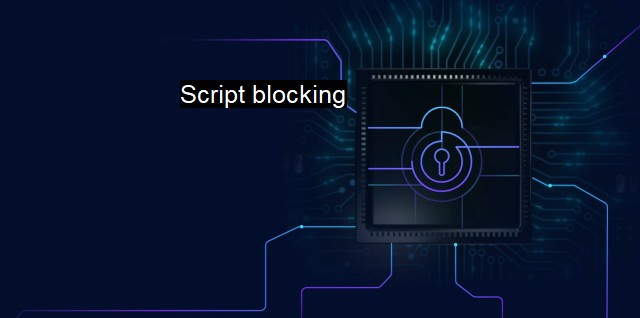What is Script blocking?
The Crucial Role of Script Blocking in Safeguarding Against Malicious Computer Scripts: A Comprehensive Overview
Script blocking is a key concept in cultural cybersecurity practices that often gets overlooked but is crucial in the ever-evolving landscape of cybersecurity threats. In simple terms, script blocking refers to the cybersecurity technique of treating certain types of scripts, specifically scripts that can execute code without explicit user consent, as potential threats to the integrity of a system. This technique relies on preventing or mitigating the risk those scripts pose on the system by disrupting or outright preventing their functionality.Scripts are essentially small pieces of code that are intended to automate certain tasks. They are ubiquitous in the world of computing. They are a vital part of many websites, enabling the interactive parts of the site that make it more user-friendly. Scripts are also crucial in numerous other contexts such as automating repetitive tasks or jobs that would take unacceptably long if done manually. they are versatile tools in computing. the same traits that make scripts so useful also make them potential cybersecurity threats.
The problem with scripts is twofold. The first issue is that scripts automate tasks – and while this is often beneficial, it can also automate harmful activities. scripts can often execute without explicit user consent, which means they can carry out damaging tasks without alerting or asking the permission of the user. They can install malware, delete or alter important files, or expose sensitive data. Scripts are a common vector for various sorts of cyber threats, from phishing attacks to worms and ransomware.
Not all scripts are malicious, of course. The vast majority of scripts are harmless and serve to improve the user's experience. it can be difficult or impossible to distinguish between harmful and harmless scripts based on their content alone. Thus, script blocking comes into play as a blanket precaution against all scripts.
Script blocking can be performed by a wide array of cybersecurity tools, including antivirus software, firewall configurations, and even certain browser settings. These tools can detect and block scripts, preventing them from executing their code. This significantly reduces the possible attack surface of a cyber threat actor, making it much harder for them to compromise the system by means of scripting attacks.
Some script blocking tools allow granular control, offering the ability to customize what sort of scripts are blocked and under what conditions. Such flexibility is advantageous as some scripts may be necessary for certain websites or applications to work properly. Striking a balance between usability and security is a crucial part of effective script blocking.
The concern with script blocking mainly stems from its potential to disrupt the proper functionality of websites or software that heavily rely on scripts. the possible inconvenience caused by blocked scripts is a small price to pay when considering that successful script attacks can lead to data breaches or compromised systems.
Nowadays, many script blocking tools use varying degrees of heuristic analysis to differentiate between safe scripts and potential threats. Such an approach is unfortunately not foolproof due to the ever-changing nature of malware. it is a significant improvement over simple blanket bans on all scripts, as it permits the usability benefits of scripts while still providing a degree of cybersecurity.
Script blocking is a vital component of a comprehensive cybersecurity strategy. Despite its potential to limit certain functionalities, its protective value in the face of increasing cyber threats should not be overlooked. As scripts continue to be a preferred tool for cyber threat actors, script blocking will remain a crucial safeguard in protecting system integrity.

Script blocking FAQs
What is script blocking in the context of cybersecurity and antivirus?
Script blocking is a security feature that prevents the execution of malicious scripts on a computer. These scripts can be embedded in websites, emails or downloaded files and can execute harmful actions such as stealing sensitive information, installing malware, or taking over control of the computer.What are the benefits of using script blocking?
Script blocking provides an additional layer of security to your computer and prevents malicious code from running without your knowledge. It can also reduce the risk of malware infections and protect your personal and financial information from being stolen.Can script blocking interfere with legitimate websites or applications?
Yes, sometimes script blocking can interfere with legitimate websites or applications that use scripts for their functionality. In some cases, you may need to add exceptions to allow specific scripts to run properly.How can I enable or disable script blocking on my antivirus software?
The process for enabling or disabling script blocking on an antivirus software varies depending on the program. Generally, script blocking is enabled by default, but you can check your software's settings or help documentation to find instructions on how to disable or adjust the feature as needed.| | A | | | B | | | C | | | D | | | E | | | F | | | G | | | H | | | I | | | J | | | K | | | L | | | M | |
| | N | | | O | | | P | | | Q | | | R | | | S | | | T | | | U | | | V | | | W | | | X | | | Y | | | Z | |
| | 1 | | | 2 | | | 3 | | | 4 | | | 7 | | | 8 | | |||||||